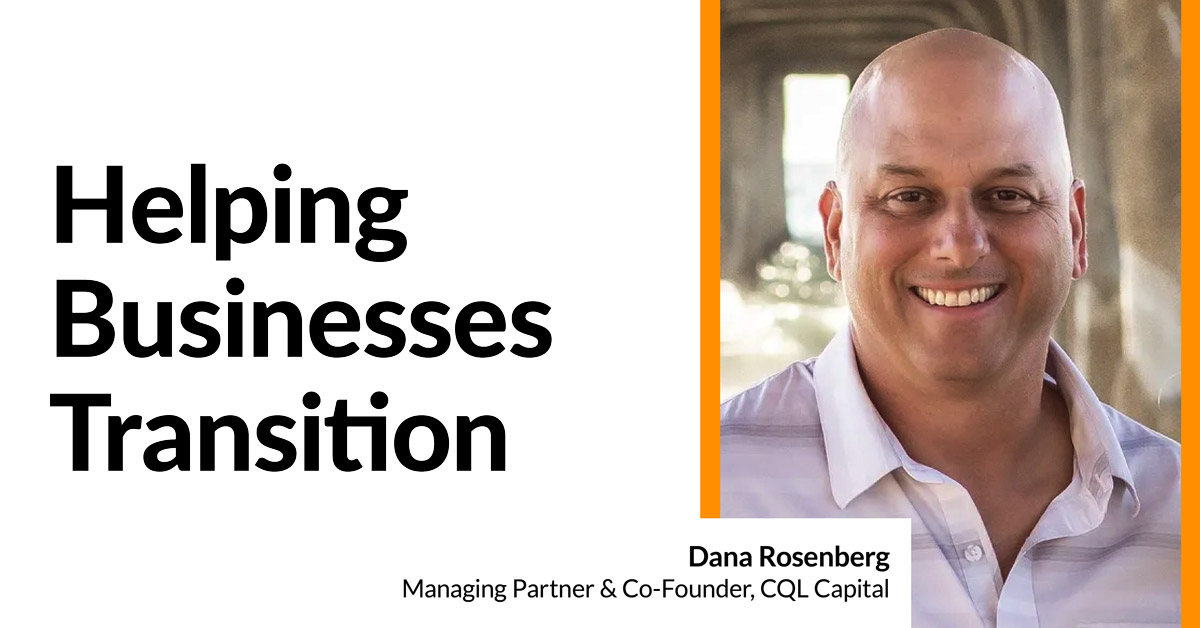How To Navigate The Emotional Side Of Selling
Bonnie Elgie

Vern Sabeski is an entrepreneur who knows first-hand about the emotional and psychological side of selling a company built from the ground up. He recently sold a successful software company and is sharing how to ensure your emotions don’t jeopardize the deal. In this article you’re learn:
- the most important way to remove emotion from the deal
- how to manage the emotions that will inevitably come up
- how to make sure you’re ready for what comes next.
With a university degree, an interest in tech and a few years of municipal experience, Vern Sabeski bought a used computer, taught himself to code and built one of Canada’s largest municipal software companies, All-Net Municipal Solutions. He attributes his strong entrepreneurial spirit to growing up in a family business and understanding the importance of creating a culture that encouraged an entrepreneurial spirit.
Vern decided to sell following some honest soul searching. He says the process of selling is not an easy one as it’s an experience filled with emotional ups and downs. He suggests regularly taking a step back to look at yourself and the environment you’re in, and then chart your course accordingly. He never intended to run his company forever and knew he’d someday want a new challenge.
Vern’s advice is that once your business reaches a certain size, you cannot sell it yourself because it will literally cost you. He knows this from personal experience. A few years earlier he got through the due diligence stage, he had a deal in front of him and then realized he’d made some mistakes with how he’d handled things and knew it was going to cost him in the valuation of his company. He recognized that putting another five years into the business would take it to the next level, so he ended the first deal.
When he made his decision to sell for the second time, discussions started with his accounting firm and a plan took shape. Knowing he wanted to build a trusted team to help with the sale he added a business advisor and a law firm. Vern shares that it’s important to have strong trust, but not blind trust, in your team and the reasons for this is that the sales process is not all “flowers and sausages”. You don’t simply sell your company and walk away with the riches, there’s so much more to the process.
“If you believe you can separate emotionally enough from your business to manage the deal yourself and still get the best possible deal, that’s naïve thinking,” Vern says. He shares the following tips for making the most of your deal.
- Realize there's just no good way to sell your own company. It’s a roller coaster experience and you need a good team of people to help you navigate the sales process and make the best decisions, so put together a good team.
- Decide what you want before the team begins the process. What number are you looking for? What do you want in a partner? Where do you picture your company going after it sells? PULLOUT: “The first thing I did was determine a number I wanted from the deal and wrote it down for future reference. The number you see early on is likely not going to be the end number because the sell process is full of peaks and valleys.”
- Trust the process and keep moving forward. The ups and downs of the sale process are going to get to you. “There will be times in the process where you just want to quit, you’ll want to walk away from the deal because you're tired, or you don't like the way you're being treated, or how you think you're being treated. A few months into the deal ask yourself, ‘Am I still on track for what I would have accepted when this started?’ If so, then realize it’s just emotion getting in the way of process and it’s not actually the buyer doing anything wrong.
“The first thing I did was determine a number I wanted from the deal and wrote it down for future reference. The number you see early on is likely not going to be the end number because the sell process is full of peaks and valleys.”
How to separate the emotion
At the end of the day, the buyer’s goal is getting the best company at the best price. You're also trying to get the best deal. You can’t blame a buyer for asking a thousand questions and requests during due diligence, but that’s why you should have a good team in place. Let the advisor, accountant and lawyer quarterback all that or you’re going to become mentally exhausted because you’re emotionally tied to the company.
Vern suggests letting your team shield you. Imagine you did personally quarterback all those due diligence requests. You’d probably feel exhausted and ready to give up. Once someone sees you’re vulnerable, the price is going to drop. Then you start thinking, ‘Geez, I’ve already invested six months to the process’ so you might be willing to entertain that lower price. You don't ever want to get yourself into that position and a good team will shield you from that. I am telling you there is no way to totally separate the emotion.
It's a lonely process…
Even as a sole proprietor, Vern admits you don’t go through the journey of building your company completely alone. You surround yourself with a team to build a company that includes employees, partners, your spouse. These people are involved in your life and helping you to achieve success and continue growing that company. But as many entrepreneurs know, at the end of the day, it is you alone who constantly plans and obsesses over every decision.
When the time comes to let go and sell, memories come up—the excitement of getting a new client, creating a new product, the time you fell flat on your face and got back up. Vern explains, “All those trials and tribulations are somehow more important than the money. And it becomes lonely because you're only talking with yourself as you plan to end this important relationship. It does become emotional and personal, and you’ve got to find a way to deal with all those thoughts.”
Letting go after the deal…
Vern has a valuable piece of advice for anyone thinking about selling their company. “Give really serious thought on what you want to do next and give yourself a fair amount of time to figure that out. Not knowing what’s next is not a good place to be. As an entrepreneur, you’ve lived with purpose. Once that's gone, you kind of feel like you're living a purposeless life. You need to figure out your move and you should give yourself some time before you leap into the next thing.”
BACK










